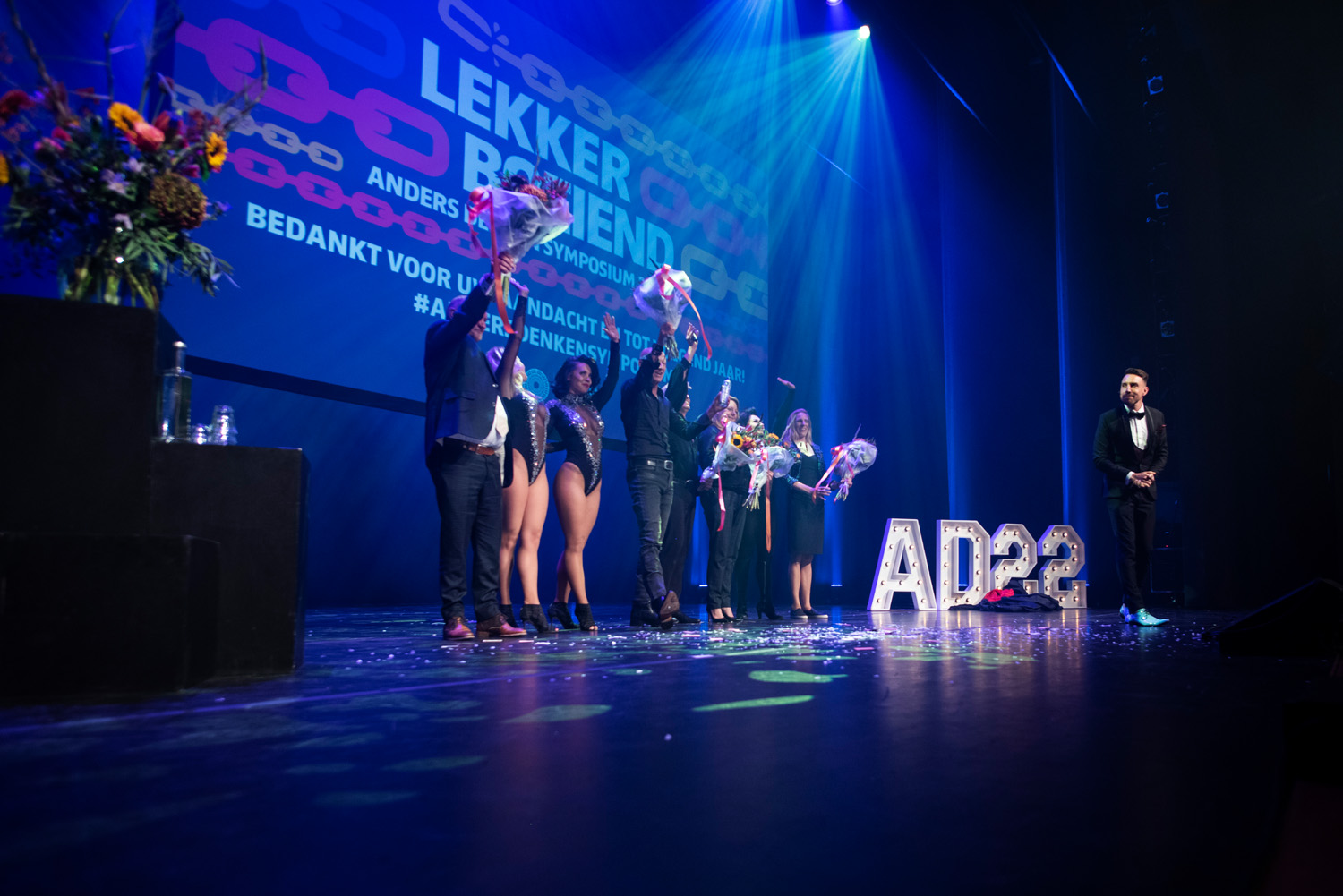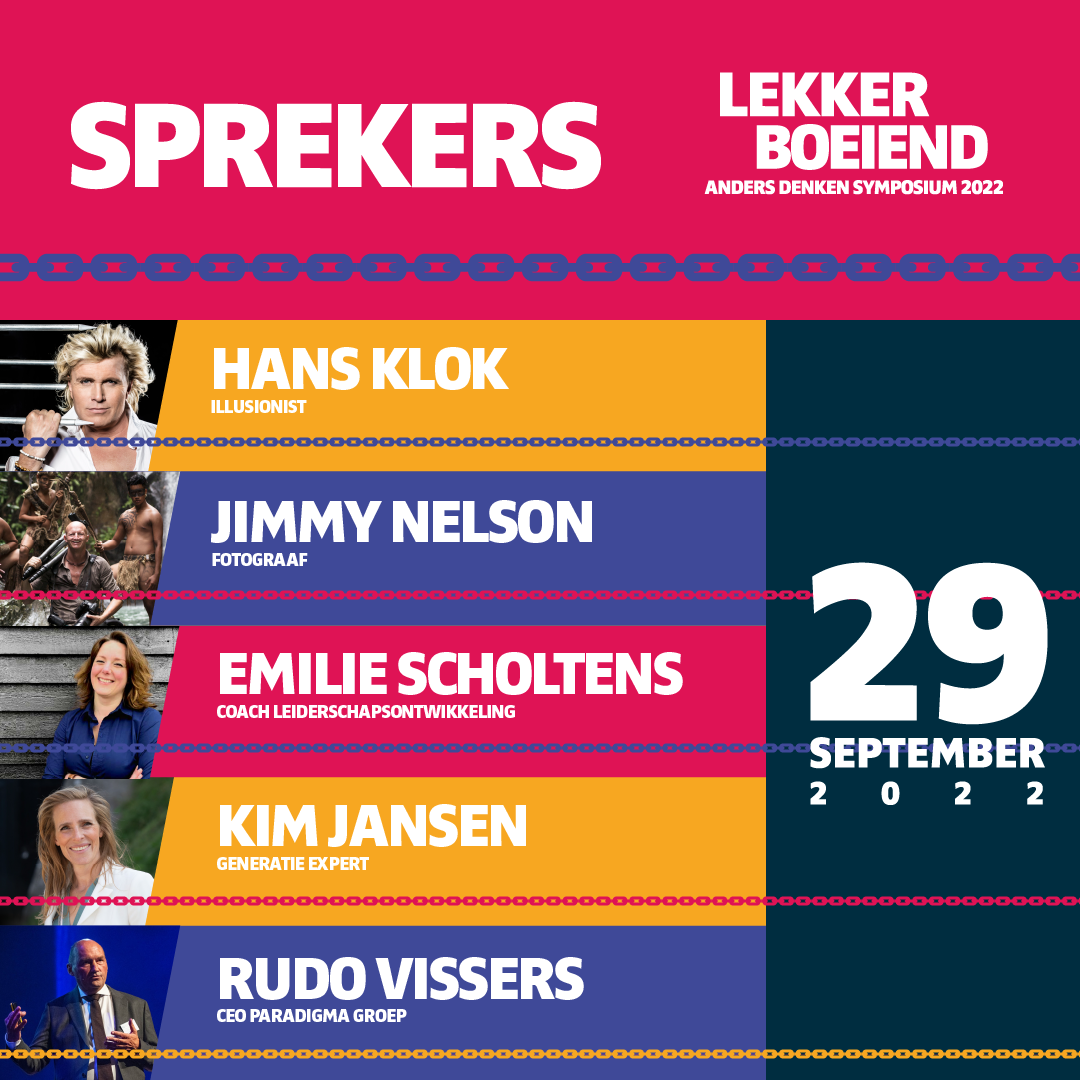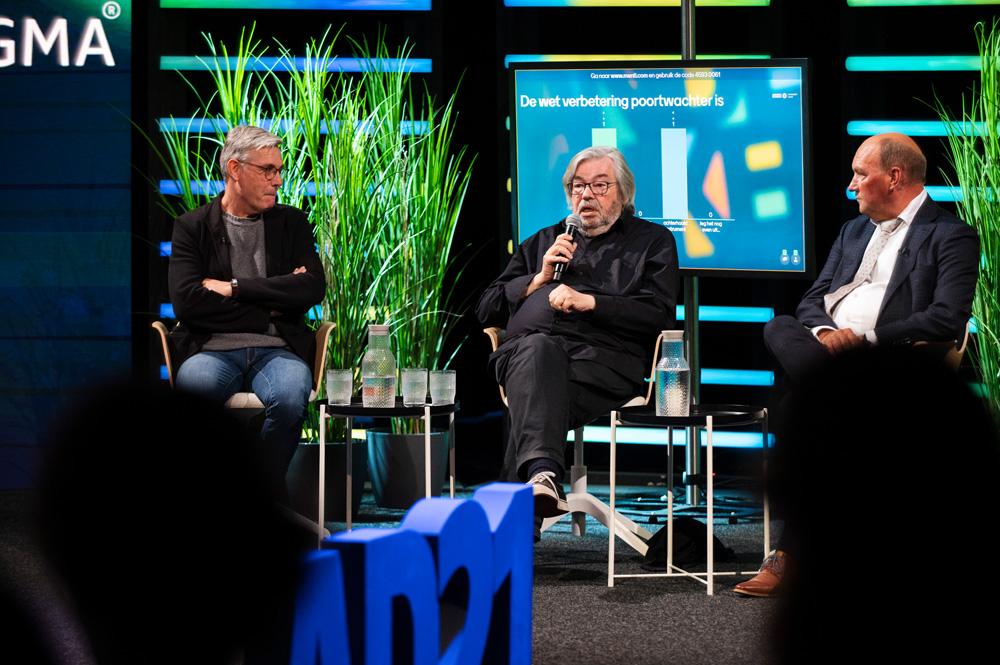The Different Thinking Symposium 2022: the sense and nonsense of binding and captivating
Every year paraDIGMA Group organizes the Different Thinking Symposium to inspire and encourage HR professionals, executives and management to think outside the box. This year it was finally possible to meet physically again. This edition was all about binding and engaging employees. Because with the tightness in the labor market, this is keeping many employers busy. In a packed Flint Theater in Amersfoort, speakers Rudo Vissers, Emilie Scholtens, Kim Jansen and Jimmy Nelson each gave a different perspective on the world of labor and health.
Not bind and enthrall, but grow by inspiring and pruning
Rudo Vissers, CEO of paraDIGMA groep, opened the evening with the statement that today we are too much led by fear: "We are afraid of a virus, a war or a recession. And also in the workplace we are constantly anxious that someone will leave." A big mistake, according to him. Instead of frantically holding on to staff who you actually notice are no longer in their place, it's better to start the conversation and look for a solution to do experience job satisfaction again. "Perhaps there are internal opportunities for another position or adjustment of work. And if not, just accept that. Help someone out instead of holding onto someone with a lease car, more vacation days or extra salary." By doing so, he says, we only drive up absenteeism.
Those who want to captivate people must do so from intrinsic motivation and work content, according to Rudo. "Give people autonomy, trust, ownership and focus on personal growth and development. Of course good work should be rewarded, but don't try to bind and enthrall with factors that have nothing to do with the work. A person should stay because he or she enjoys going to work." Rudo therefore advocates a new adage: "Don't bind and captivate, but grow by inspiring and pruning.
Context determines behavior
Next, Emilie Scholtens, leadership coach and consultant and ex-Jehovah's Witness, shared her perspective on the effect of being bound and captivated with a personal story. Emilie cited the example that individuals can feel very small, dependent and insecure in one situation, and at the same time very strong and responsible at another. "The explanation for this is that context determines behavior. More often than you think, there are unhealthy dynamics in situations," she explained. "This has the effect of making us want to conform and try to behave according to unwritten rules instead of being ourselves. That can make it feel impossible to be or act autonomously."
But what is healthy dynamics? According to Emilie, there has to be room for everyone, give and take has to be in balance and the order in the system has to be right. "You have to see these elements continuously. But there are usually very different dynamics in organizations." The role of managers plays a crucial role in this, according to Emilie. She explains, "As a manager, you not only set the context, you are it. You can employ as many talented people as you want, but if there is no room for them to make choices, go by your gut and take responsibility, they will remain small and start to conform."
She asked attendees to think about what own behavior really makes a difference. "Can you make change? Can you stop binding and captivating and start with real connection? Can you create a place where employees can really get to work using their expertise and talents?" That this is difficult, Emilie does not deny. "Nobody goes to work with the intention of making someone small and dependent with their behavior. Yet it does happen. Therefore, be critical of yourself. Step away from things that feel safe, like programs we make up to give us a grip. Do something you are not familiar with. You have the chance and choice every day to do things differently and take steps," she concludes.
The key to an energetic and future-proof organization
The third speaker was Kim Jansen. As a generational expert, she took attendees into the world of generations in the workplace and the challenges as well as opportunities to strengthen each other. "Because although we cannot attribute all differences to a generation gap, generation differences can sometimes be so great that they transcend individual differences," she explained. According to Kim, we are all partly the product of the zeitgeist in which we were raised. She took the audience through the characteristics of different generations and how this manifests itself in the workplace. For example, in different career paths and ambitions. Where for one person 25 years in service is admirable, another labels it as unambitious. The same goes for taking a sabbatical before the age of 30. One person thinks it's total posturing, and for someone else it's a matter of "why not?
Frictions in the workplace, according to Kim, often have to do with older generations who - very generally speaking - are often still hung up on the profit and power mentality. They like status, power, prestige and control. The younger generation tends much more toward a purpose and pleasure mentality, where change, freedom, trust and chaos play a major role. "One is not necessarily better than the other," Kim explains. The question is who should adapt to whom. "If you have to choose, I say old should adapt to young. What energizes the young generation is often the key to updating your organization," Kim says.
So is that the holy grail? Certainly not. According to Kim, in practice a combination is obviously necessary in which everyone has to give and take. "The future sustainability of your organization depends on the youthfulness of all generations and the quality of interaction between them." Kim is therefore not in favor of a focus on keeping staff in. Because, she argues, "You can't prevent people from leaving. Rather, focus on how to get the best out of people. By combining the knowledge, influence and experience of the old with the fresh perspective, creativity and innovative power of the young. That is the key to an energetic and future-proof organization."
Magical closure
The final speaker was photographer Jimmy Nelson. Thanks to his inspiring life story, he took the attendees through the challenges that different cultures sometimes create. He inspired the audience to work on mutual trust, building connections and to look differently at the world around you. Those who dare to look differently will discover that beauty and connection are often closer than you think.
The symposium ended with a splashing performance by none other than illusionist Hans Klok, who entertained the audience with a surprising show and managed to engage and captivate them in his own unique way. At the subsequent networking reception there was plenty to talk about.
We look back on a very successful evening with inspiring speakers, impressive acts and an enthusiastic audience. We hope you will look at problems or challenges you are facing, both on a business and personal level, with a different perspective.
Will we see you next year (again)?
As every year, the Different Thinking Symposium is on the last Thursday of the month; please circle September 28, 2023 in your calendar and sign up at www.andersdenkensymposium.nl for the newsletter so that you will be the first to be notified when registration opens!

Come work for paraDIGMA groep and help us make a difference in the field of Sustainable Employability!
RELATED POSTS
Take up the challenge! Register for the Different Thinking Symposium on September 27, 2023, organized by paraDIGMA groep. During this symposium, we challenge you to think outside the box [...].
Thursday, September 29 from 4 p.m. the Anders Denken Symposium 2022 will take place at Het Flint Theater in Amersfoort. This year's theme; "Lekker boeiend!". Due to the tightening labor market [...]
The paraDIGMA groep Anders Denken Symposium 2021 was once again a success! September 2021 marked this year's Anders Denken Symposium with the theme "Looking Different. Four diverse [...]




